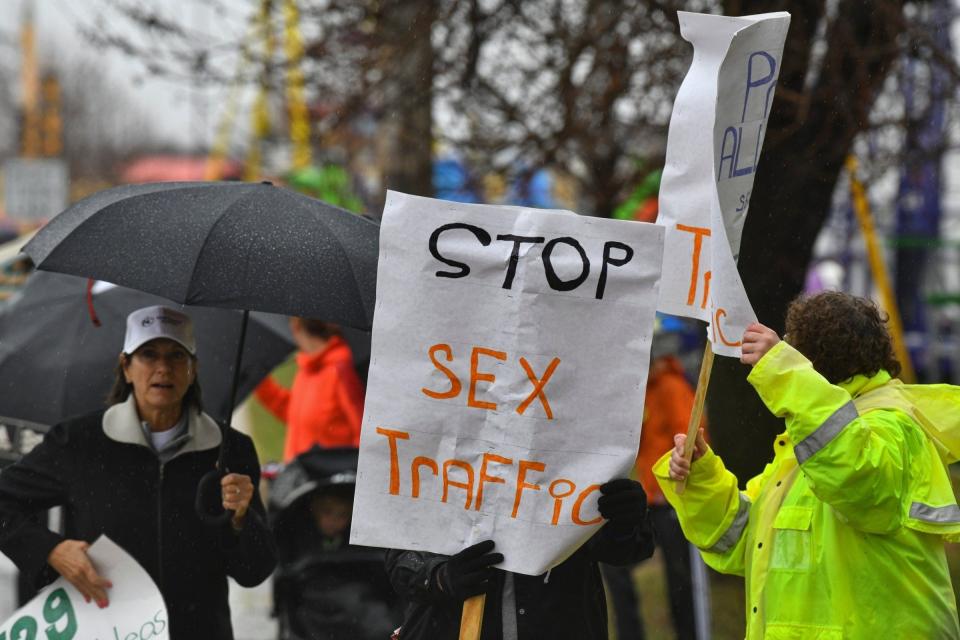Commentary: How we fail victims of child sexual abuse and trafficking
Despite what we see in the movies or on television, sex trafficking doesn’t usually look like what you might think.
Imagine being a 16-year-old child sex trafficking victim, groomed and trafficked to adult men while still just a sophomore in high school. Then imagine being charged as an adult and sentenced to 12 long years in prison for a murder committed by your trafficker. That nightmare scenario is just what happened to one child victim from Grand Prairie - Zephi Trevino - whose story tragically illustrates how the justice system fails young girls impacted by violence.
The criminalization of survivors can take many forms. However, in Zephi’s case it turns on one critical fact – she was a victim of child trafficking. When she was first groomed and exploited by an older man, Zephi was just a kid in high school. Then, as is far too common with child sex trafficking victims across America, Zephi was re-victimized by a system that not only discredited her, but prosecuted her as an adult for a murder she herself did not commit. And this transpired even though federal law makes clear that anyone under 18 involved in the commercial sex trade is, by definition, a victim of sex trafficking, regardless of whether force, fraud, or coercion is used.

For Zephi, the signs putting her down this dangerous path were subtle. Her family reported noticing some slight changes in behavior: staying out later than usual, returning home in clothing they didn’t recognize, and hanging out with an older adult “boyfriend.” There was also a far more obvious red flag: adults coming to the apartment to have sex with her. Again, under federal law, 16-year-old Zephi was a victim of sex trafficking and under Texas law, she was a victim of statutory rape. The prosecution failed Zephi by ignoring these basic details– denying both her status as a child and as a crime victim.
Many child sex trafficking survivors are also victims of labor trafficking, which stems from them being forced to commit additional crimes, in addition to their sexual exploitation. These coerced criminal acts can be of various stripes, but often include drug possession, drug trafficking, loitering, theft, possession of stolen property, and status offenses, such as running away or truancy. Sadly, child trafficking victims are also forced to commit violent crimes at the behest of their abusers - including robbery of buyers who sought to rape or exploit them, often to meet their trafficker’s quota. Here, Zephi helped lure the adult buyers who came to “have sex” with her so her trafficker could then rob them. However, while Zephi was searching the men’s cars outside, her trafficker shot and killed one of those buyers.
Zephi’s case is also an example of how a “credibility discount” can devastatingly play out in reality. As described in a new report, this “discount” describes how young girls of color are less likely to be believed by law enforcement and public systems when they disclose abuse. When survivors of trafficking aren’t believed, they’re too often arrested and charged alongside their own abusers as if they had full agency in the commission of the crime. When law enforcement and prosecutors repeatedly diminish survivors’ accounts, the damage can be impossible to undo.
However, if we reframe our thinking about what it means to be a trafficking victim – by believing survivors instead of discrediting them - this harm and re-victimization can be avoided. If Zephi was believed by law enforcement, and rightfully seen as a child and victim, she could have remained in the juvenile justice system. There, she could have received age-appropriate, trauma-informed treatment, or possibly, even community-based services and support. If authorities gave credence to what Zephi went through, she would not have found herself making the impossible decision to plead guilty to a murder she did not commit at risk of facing a possible life sentence. But by choosing to charge Zephi as an adult for her role in the death of her adult buyer, prosecutors ignored everything we know about children and victims of sex trafficking, and compounded her trauma. If only law enforcement, prosecutors and courts recognized the signs of trafficking and understood that not all sex trafficking victims fit into a one-size-fits-all mold, Zephi could be facing a much different present and future.
But Zephi’s story need not end as tragically as it began. Just this summer in Oklahoma passed a common-sense law allowing judges to apply a trauma-informed lens and depart from mandatory sentences for girls just like Zephi. Moreover, governors all around the country have stepped in and commuted the sentences of child sex trafficking victims in similar instances, and that includes tough-on-crime Republican governors. We hope that Governor Greg Abbott takes this step as well, and that he will rectify this grave injustice here in Texas by commuting Zephi's sentence. It is not enough to simply learn from our mistakes. We must also repair, and that starts with those who have the moral courage and ability to do what is right for these children.
Kruzan is a Stoneleigh fellow with Human Rights for Kids, and author of “I Cried to Dream Again: Trafficking, Murder, and Deliverance — A Memoir.”
Vafa is a human rights attorney and executive director of Rights4Girls, a national organization working to protect marginalized young women and girls impacted by violence.
This article originally appeared on Austin American-Statesman: Commentary: How we fail victims of child sexual abuse and trafficking

